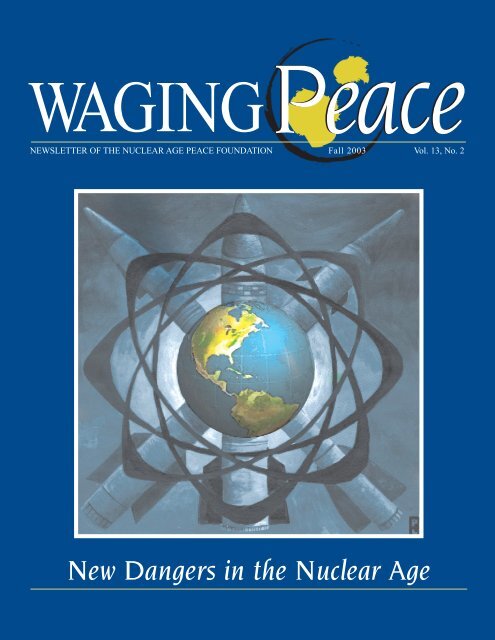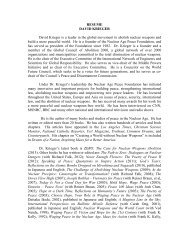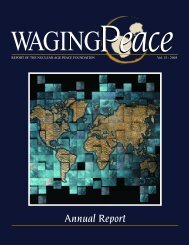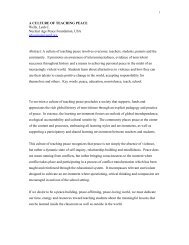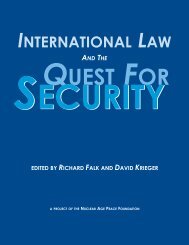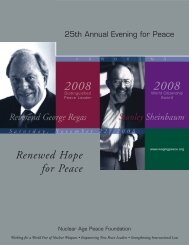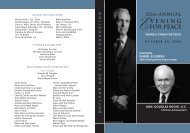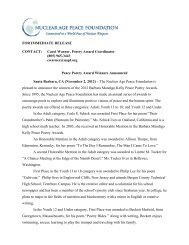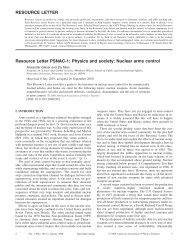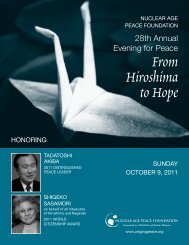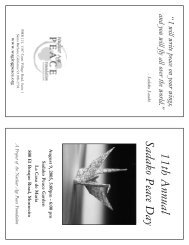Fall 2003 Vol 13-2 - Nuclear Age Peace Foundation
Fall 2003 Vol 13-2 - Nuclear Age Peace Foundation
Fall 2003 Vol 13-2 - Nuclear Age Peace Foundation
You also want an ePaper? Increase the reach of your titles
YUMPU automatically turns print PDFs into web optimized ePapers that Google loves.
<strong>Peace</strong><br />
WAGING<strong>Peace</strong><br />
NEWSLETTER OF THE NUCLEAR AGE PEACE FOUNDATION <strong>Fall</strong> <strong>2003</strong> <strong>Vol</strong>. <strong>13</strong>, No. 2<br />
New Dangers in the <strong>Nuclear</strong> <strong>Age</strong>
CONTENTS<br />
WAGING<strong>Peace</strong><br />
PRESIDENT’S MESSAGE 1<br />
<strong>Fall</strong> <strong>2003</strong> • <strong>Vol</strong>. <strong>13</strong>, No. 2<br />
Editors:<br />
David Krieger and<br />
Frank K. Kelly<br />
CONFRONTING NEW DANGERS<br />
IN THE NUCLEAR AGE 2-3<br />
TRIBUTE TO WALLACE DREW 4<br />
Associate Editor:<br />
Chris Pizzinat<br />
20TH ANNUAL EVENING FOR PEACE 5<br />
Copy Editors:<br />
Ilene Pritikin and<br />
Selma Rubin<br />
Design/Production:<br />
Samer Mina<br />
Waging <strong>Peace</strong><br />
(ISSN 1092-2636) is a<br />
newsletter published by the<br />
<strong>Nuclear</strong> <strong>Age</strong> <strong>Peace</strong> <strong>Foundation</strong>, a<br />
non-profit, non-partisan, international<br />
education and advocacy<br />
organization which provides leadership<br />
toward a nuclear weaponsfree<br />
world under international<br />
law. Waging <strong>Peace</strong> is distributed<br />
internationally.<br />
NAPF BOARD STATEMENT 6-7<br />
FOUNDATION ACTIVITIES 8-9<br />
• <strong>Nuclear</strong> Non-Proliferation Treaty in Geneva<br />
• UNESCO Conference on Teaching and Learning<br />
• Sadako <strong>Peace</strong> Day<br />
• <strong>Peace</strong> Retreat<br />
PROGRAM UPDATES 10-11<br />
• American Civil Liberties &<br />
Human Rights Under Siege<br />
• UC <strong>Nuclear</strong> Free Campaign<br />
• Youth Outreach Initiative<br />
• International Law & The Quest for Security<br />
Page 5<br />
Page 4<br />
Letters to the Editor:<br />
Your comments relating to any<br />
article printed in Waging <strong>Peace</strong><br />
are encouraged. Please address all<br />
correspondence to:<br />
HIGHLIGHTS 12<br />
RESOURCES <strong>13</strong><br />
Page 10, 11<br />
<strong>Nuclear</strong> <strong>Age</strong> <strong>Peace</strong> <strong>Foundation</strong>,<br />
1187 Coast Village Rd.,<br />
Suite 1-121, Santa Barbara, CA.<br />
93108-2794 USA<br />
Tel (805) 965-3443<br />
Fax (805) 568-0466<br />
E-mail: wagingpeace@napf.org<br />
www.wagingpeace.org<br />
About the cover:<br />
The cover image was<br />
provided by Paul Lachine,<br />
an artist/illustrator living in<br />
Ontario, Canada.<br />
DIRECTORS: Richard Falk, J.S.D., Chair • David Krieger, J.D., Ph.D., President • Frank K. Kelly, Senior Vice President •<br />
Lessie Sinclair Nixon, Secretary • Selma Rubin, Treasurer • Diandra Douglas • Léni Fé Bland • Anna Grotenhuis, J.D. • Mark<br />
Hamilton • Peter O. Haslund, Ph.D. • Marc Kielburger • Eli Luria ** • Peter R. MacDougall, Ed.D., • Anita Roddick •<br />
Jennifer Allen Simons, Ph.D. • Imaging Spence • Ethel R. Wells<br />
ADVISORY COUNCIL: Hafsat Abiola • Hon. Lloyd Axworthy, Ph.D., PC • Helen Caldicott, M.D. • Hon. Rodrigo Carazo •<br />
Jean-Michel Cousteau • Michael Douglas • Anne H. Ehrlich, Ph.D. • Paul R. Ehrlich, Ph.D. • Daniel Ellsberg, Ph.D. •<br />
Benjamin B. Ferencz, J.D. • Harrison Ford • Johan Galtung, Dr hc mult • Rev. Theodore M. Hesburgh, C.S.C.• The XIVth<br />
Dalai Lama* • Hon. David Lange, C.O.H. • Admiral Gene R. La Rocque • Bernard Lown, M.D.* • Mairead Corrigan Maguire*<br />
• Alan McCoy, O.F.M. • Hon. Robert Muller • Queen Noor of Jordan • Admiral L. Ramdas • Hon. Arthur N.R. Robinson •<br />
Hon. Douglas Roche, O.C. • Sir Joseph Rotblat, Ph.D., F.R.S.* • Jonathan Schell • Stanley K. Sheinbaum • Gerry Spence, J.D.<br />
• Ted Turner • Archbishop Desmond M. Tutu*<br />
CONSULTANTS: Larry Agran, J.D. • Robert C. Aldridge • Dean Babst • Eric H. Boehm, Ph.D. • Francis A. Boyle, J.D., Ph.D.<br />
• Selma Brackman • Adam Curle, Ph.D. • M. M. Eskandari-Qajar, Ph.D. • Dietrich Fischer, Ph.D. • Don George • Jonathan<br />
Granoff, J.D. • Gene Knudsen Hoffman • Fred H. Knelman, Ph.D. • Peter R. MacDougall, Ed.D.• Ved P. Nanda, L.L.M. •<br />
Farzeen Nasri, Ph.D. • Jan Øberg, Ph.D. • Dan K. Smith, Ph.D. • Theodore B. Taylor, Ph.D. • Leonard Wallock, Ph.D. •<br />
Burns H. Weston, J.S.D. • Robert C. Wilkinson<br />
STAFF: Luke Brothers • Michael Coffey • Samer Mina • Kristen Morrison • Michelle Myers • Christopher Pizzinat • Ramona<br />
Romero • Sharon Rossol • Justine Wang<br />
INTERNS & VOLUNTEERS: David Benson • Emma Carswell • Michael Cox • Brit Fenton-Olsen • Victoria Hassid • Irina<br />
Kozlova • Leslie Lai • Scott MacKenzie • Angela McCracken • Jui Shah • Lisa Swid<br />
*Nobel <strong>Peace</strong> Laureate<br />
** Director Emeritus<br />
Waging <strong>Peace</strong>, <strong>Fall</strong> <strong>2003</strong>
Is a <strong>Nuclear</strong> 9/11 In Our Future<br />
S<br />
ooner or later there will be a nuclear 9/11 in an American city<br />
or that of a US ally unless a serious program is undertaken to<br />
prevent such an occurrence. A terrorist nuclear attack against an<br />
American city could take many forms. A worst case scenario would<br />
be the detonation of a nuclear device within a city. Depending<br />
upon the size and sophistication of the weapon, it could kill hundreds<br />
of thousands or even millions of people.<br />
Terrorists could obtain a nuclear device by stealing or purchasing<br />
an already created nuclear weapon or by stealing or purchasing<br />
weapons-grade nuclear materials and fashioning<br />
a crude bomb. While neither of these options<br />
would be easy, they cannot be dismissed as<br />
beyond the capabilities of a determined terrorist<br />
organization.<br />
If terrorists succeeded in obtaining a nuclear<br />
weapon, they would also have to bring it into the<br />
US, assuming they did not already obtain or create<br />
the weapon in this country. While this<br />
would not necessarily be easy, many analysts have<br />
suggested that it would be within the realm of<br />
possibility. An oft-cited example is the possibility<br />
of bringing a nuclear device into an American<br />
port hidden on a cargo ship.<br />
Another form of terrorist nuclear attack requiring far less sophistication<br />
would be the detonation of a radiation weapon or “dirty<br />
bomb.” This type of device would not be capable of a nuclear<br />
explosion but would use conventional explosives to disperse<br />
radioactive materials within a populated area. The detonation of<br />
such a device could cause massive panic due to the public’s appropriate<br />
fears of radiation sickness and of developing cancers and<br />
leukemias in the future.<br />
A bi-partisan task force of the Secretary of Energy’s Advisory Board,<br />
headed by former Senate Majority Leader Howard Baker and former<br />
White House Counsel Lloyd Cutler, called upon the US in<br />
2001 to spend $30 billion over an eight to ten year period to prevent<br />
nuclear weapons and materials in the former Soviet Union<br />
from getting into the hands of terrorists or so called “rogue” states.<br />
The task force called the nuclear dangers in the former USSR “the<br />
most urgent unmet national security threat facing the United States<br />
today.” At present, the US government is spending only about onethird<br />
of the recommended amount, while it pours resources into<br />
By David Krieger<br />
PRESIDENT’S<br />
MESSAGE<br />
paying for the invasion, occupation and rebuilding of Iraq as well<br />
as programs unlikely to provide effective security to US citizens<br />
such as missile defense.<br />
The great difficulty in preventing a nuclear 9/11 is that it will<br />
require ending the well-entrenched nuclear double standards that<br />
the US and other nuclear weapons states have lived by throughout<br />
the <strong>Nuclear</strong> <strong>Age</strong>. Preventing nuclear terrorism in the end will not<br />
be possible without a serious global program to eliminate nuclear<br />
weapons and control nuclear materials that could be converted to<br />
weapons. Such a program would require universal<br />
agreement in the form of a verifiable and<br />
enforceable treaty providing for the following:<br />
• full accounting and international safeguarding<br />
of all nuclear weapons, weapons-grade nuclear<br />
materials and nuclear reactors in all countries,<br />
including the nuclear weapons states;<br />
• international tracking and control of the movement<br />
of all nuclear weapons and weapons-grade<br />
materials;<br />
• dismantling and prohibiting all uranium<br />
enrichment facilities and all plutonium separation<br />
facilities, and the implementation of a plan to expedite the<br />
phasing out of all nuclear power plants;<br />
• full recognition and endorsement by the nuclear weapons states<br />
of their existing obligation pursuant to the <strong>Nuclear</strong> Non-<br />
Proliferation Treaty for an “unequivocal undertaking” to eliminate<br />
their nuclear arsenals;<br />
• rapidly dismantling existing nuclear weapons in an orderly and<br />
transparent manner and the transfer of nuclear materials to international<br />
control sites; and<br />
•criminalizing the possession, threat or use of nuclear weapons.<br />
While these steps may appear extreme, they are in actuality the minimum<br />
necessary to prevent a nuclear 9/11. If that is among our top<br />
priorities as a country, as surely it should be, the US government<br />
should begin immediately to lead the world in this direction. Now<br />
is the time to act, before one or more US cities are devastated by<br />
nuclear terrorism.<br />
<strong>Nuclear</strong> <strong>Age</strong> <strong>Peace</strong> <strong>Foundation</strong> 1
PERSPECTIVE<br />
Confronting New Dangers in the <strong>Nuclear</strong> <strong>Age</strong><br />
By David Krieger<br />
“The world has entered<br />
a new nuclear age, a<br />
second nuclear age.<br />
The danger is rising<br />
that nuclear weapons<br />
will be used against the<br />
United States. Just as<br />
bad, the danger is rising<br />
that the United States<br />
will use nuclear<br />
weapons against<br />
others….”<br />
— Jonathan Schell<br />
W<br />
ith the fall of the Berlin Wall and the<br />
breakup of the Soviet Union, many<br />
Americans gave a deep sigh of relief and pronounced<br />
the nuclear threat at an end. It was a<br />
heady time. I can remember being asked,<br />
“What will the <strong>Nuclear</strong> <strong>Age</strong> <strong>Peace</strong> <strong>Foundation</strong><br />
do now that the nuclear threat is gone” My<br />
response was that the nuclear threat was still<br />
with us despite these momentous changes in the<br />
geopolitical landscape. It was far too soon to<br />
pronounce the <strong>Nuclear</strong> <strong>Age</strong> dead.<br />
In retrospect, from a vantage point of more<br />
than 12 years after these tectonic shifts in<br />
geopolitics, we can see that the <strong>Nuclear</strong> <strong>Age</strong>,<br />
with new and growing dangers, is still with us.<br />
The first half-century of the <strong>Nuclear</strong> <strong>Age</strong> was<br />
marked by a mad arms race between the United<br />
States and the former Soviet Union that resulted<br />
in the development and deployment of tens<br />
of thousands of nuclear weapons capable of<br />
destroying civilization and most life on Earth.<br />
While the nuclear standoff between the US and<br />
former USSR is no longer the extraordinary<br />
danger it was, new nuclear dangers have arisen<br />
that have led many observers to the conclusion<br />
that we have entered a second <strong>Nuclear</strong> <strong>Age</strong>.<br />
Among these new dangers are:<br />
• the nuclear standoff between nuclear-armed<br />
rivals India and Pakistan, two countries that have<br />
more than a fifty-year history of warfare and serious<br />
tensions;<br />
• the partial breakdown of command and control<br />
systems that protect nuclear weapons and<br />
weapons-grade nuclear materials in the former<br />
Soviet countries, giving rise to the increased possibility<br />
that these weapons and materials could<br />
fall into the hands of other countries and terrorist<br />
organizations;<br />
• the pursuit of nuclear weapons programs and<br />
the development of nuclear arsenals by countries,<br />
such as North Korea and possibly Iran, that<br />
feel threatened by the Bush administration’s<br />
policy of preemptive war;<br />
• the impetus that Israel’s nuclear arsenal gives<br />
to other countries in the Middle East to develop<br />
their own nuclear arsenals;<br />
• the provocative policies of the Bush administration<br />
to pursue smaller, more usable nuclear<br />
weapons and those with a specific use in warfare<br />
such as the so-called “bunker busters,” blurring<br />
the distinction between conventional and<br />
nuclear arms; and<br />
• the possibility that the <strong>Nuclear</strong> Non-<br />
Proliferation Treaty, which has already lost its<br />
first member, North Korea, could fall apart due<br />
to the failure of the nuclear weapons states to fulfill<br />
their obligations under Article VI of the<br />
Treaty to achieve nuclear disarmament.<br />
The United States, as the world’s sole surviving<br />
superpower, has had the opportunity to lead the<br />
world toward a nuclear weapons free future. It<br />
is an opportunity that our country has largely<br />
rejected, and has done so at its own peril.<br />
Political leaders in the United States have yet to<br />
grasp that nuclear weapons make us less secure<br />
rather than more so, and their policies have<br />
reflected this failure to comprehend the new<br />
dangers of the <strong>Nuclear</strong> <strong>Age</strong>.<br />
In the year 2000, the parties to the <strong>Nuclear</strong><br />
Non-Proliferation Treaty, including the United<br />
States, agreed to <strong>13</strong> Practical Steps for <strong>Nuclear</strong><br />
Disarmament. These included “[a]n unequivocal<br />
undertaking by the nuclear-weapon states to<br />
accomplish the total elimination of their<br />
nuclear arsenals,” along with specific steps such<br />
as ratification and entry into force of the<br />
Comprehensive Test Ban Treaty (CTBT), preserving<br />
and strengthening the Anti-Ballistic<br />
Missile (ABM) Treaty, and applying the principle<br />
of irreversibility to nuclear disarmament.<br />
In each of these areas the United States, under<br />
the Bush administration, has led in the opposite<br />
direction. The administration’s policies have<br />
sent a message to the world that the world’s<br />
strongest military power finds nuclear weapons<br />
useful for its national security and plans to<br />
2 Waging <strong>Peace</strong>, <strong>Fall</strong> <strong>2003</strong>
maintain its nuclear arsenal for the indefinite<br />
future. The Bush administration has opposed<br />
ratification of the CTBT and has withdrawn<br />
from the ABM Treaty. Its approach to nuclear<br />
disarmament has been to employ maximum<br />
flexibility and make reductions fully reversible.<br />
The US pact with Russia, the Strategic<br />
Offensive Reductions Treaty (SORT), signed by<br />
Presidents Bush and Putin in May 2002, calls<br />
for reductions in deployed strategic nuclear<br />
weapons to between 1,700 and 2,200 weapons<br />
on each side by the year 2012. The treaty has<br />
no timetable other than the final date to<br />
achieve these reductions, and there is no<br />
requirement to make these reductions irreversible.<br />
The Bush administration has already<br />
announced that it plans to put the weapons it<br />
takes off active deployment status into storage<br />
ready for redeployment on short notice. The<br />
Russians are likely to follow suit, creating more<br />
opportunity for the stored nuclear weapons in<br />
both countries to fall into the hands of terrorists.<br />
In the meantime, the US and Russia are<br />
each maintaining over 2,000 nuclear weapons<br />
on hair-trigger alert, subject to being launched<br />
accidentally.<br />
In addition, the Bush administration pursued<br />
an illegal preventive war against Iraq because of<br />
its purported, but never found, weapons of<br />
mass destruction. This action sent a message to<br />
North Korea, Iran and other states that if they<br />
want to be more secure from US attack, they<br />
had better develop nuclear forces to deter the<br />
US.<br />
North Korea has repeatedly made a simple<br />
request of the US. They have asked for security<br />
assurances from the US that they will not be<br />
attacked. This is not unreasonable considering<br />
that the Korean War has never officially ended,<br />
that the US maintains some 40,000 troops near<br />
the Demilitarized Zone that separates the two<br />
Koreas, that the US keeps nuclear-armed submarines<br />
in the waters off the Korean Peninsula,<br />
and that the Bush administration has pursued a<br />
doctrine of preemption. In return for a Non-<br />
Aggression Pact from the US, the North<br />
Koreans have indicated that they would give up<br />
their nuclear weapons program and rejoin the<br />
<strong>Nuclear</strong> Non-Proliferation Treaty.<br />
It would be a great shame if Americans only<br />
awakened to the new dangers of the <strong>Nuclear</strong><br />
<strong>Age</strong> with the detonation of one or more nuclear<br />
weapons somewhere in the world. Given the<br />
increased threats associated with terrorism and<br />
the dangers that nuclear weapons or bombgrade<br />
nuclear materials could fall into the<br />
hands of terrorists, it is not beyond the realm of<br />
possibility that the next detonation of a nuclear<br />
weapon or other weapon of mass destruction<br />
could take place in a city in the United States.<br />
It is of critical importance that Americans be<br />
made aware of these dangers and reverse our<br />
policies before we are confronted by such<br />
tragedy. The <strong>Nuclear</strong> <strong>Age</strong> <strong>Peace</strong> <strong>Foundation</strong><br />
has set forth a series of needed steps that have<br />
been widely endorsed by prominent leaders,<br />
including 38 Nobel Laureates, in its Appeal to<br />
End the <strong>Nuclear</strong> Weapons Threat to Humanity<br />
and All Life. These steps are de-alerting all<br />
nuclear weapons, reaffirming commitments to<br />
the Comprehensive Test Ban Treaty and the<br />
Anti-Ballistic Missile Treaty, commencing good<br />
faith negotiations on a treaty to eliminate all<br />
nuclear weapons, declaring a policy of No First<br />
Use of nuclear weapons and reallocating<br />
resources from nuclear arsenals to improving<br />
human health, education and welfare throughout<br />
the world<br />
Our challenge is to translate this program into<br />
action. It will require a sea change in the thinking<br />
of US political leaders. This cannot happen<br />
without a grassroots movement from below, that<br />
is, from ordinary citizens, who hold the highest<br />
office in the land. The starting point is the<br />
recognition that the <strong>Nuclear</strong> <strong>Age</strong> did not end<br />
with the fall of the Berlin Wall, and that we are<br />
still living in the <strong>Nuclear</strong> <strong>Age</strong>. We ask for your<br />
support in this fight for the future of humanity<br />
and all life on our planet.<br />
Calendar of Events<br />
& Commemorations<br />
October 24<br />
United Nations Day<br />
October 24-30<br />
Disarmament Week<br />
November 15<br />
The <strong>Nuclear</strong> <strong>Age</strong> <strong>Peace</strong><br />
<strong>Foundation</strong>'s<br />
20th Annual Evening for<br />
<strong>Peace</strong> honoring Harry<br />
Belafonte and Jonathan<br />
Schell<br />
December 5<br />
<strong>Foundation</strong> to host<br />
International Law<br />
Symposium on "Preventing<br />
Genocide and Crimes<br />
Against Humanity:<br />
The Challenge of Prevention<br />
and Enforcement" at UCSB<br />
December 10<br />
Human Rights Day<br />
February 17<br />
Third Annual Frank K. Kelly<br />
Lecture on Humanity’s<br />
Future, “Kindness As a Key<br />
to Humanity’s Future” by<br />
Dame Anita Roddick<br />
Take Action<br />
We invite you to add your<br />
voice by signing and circulating<br />
the <strong>Foundation</strong>’s Appeal<br />
to End the <strong>Nuclear</strong> Weapons<br />
Threat to Humanity and All<br />
Life at:<br />
www.wagingpeace.org/menu/<br />
action/ongoing-actions/appeal/<br />
<strong>Nuclear</strong> <strong>Age</strong> <strong>Peace</strong> <strong>Foundation</strong> 3
TRIBUTE<br />
Wallace Drew, A Man of <strong>Peace</strong> (1917-<strong>2003</strong>)<br />
W<br />
allace Drew, chair emeritus of the <strong>Nuclear</strong> <strong>Age</strong> <strong>Peace</strong> <strong>Foundation</strong>, died peacefully on<br />
September 7, <strong>2003</strong> at the age of 85. Wally was one of the <strong>Foundation</strong>’s founders and served<br />
as its first treasurer and later as the first chair of the Board. A disabling stroke in 1998 slowed<br />
Wally down considerably, but he fought back courageously and remained involved in the work of<br />
the <strong>Foundation</strong> until his death.<br />
During World War II, Wally served as a major in the Army Corps of Engineers. He landed at<br />
Normandy and fought in seven major battles across France. He was part of the US forces that liberated<br />
Paris and one of the first Americans to enter the Buchenwald concentration camp. Wally<br />
received a Bronze Star and seven battle stars. After the conclusion of the war in Europe, Wally was<br />
assigned to be part of the planning group for the invasion of Japan.<br />
His experiences in war as a young man strengthened Wally’s commitment to building a peaceful<br />
world. In a 1997 interview, Wally reflected upon these experiences, “I was one of four boys. One<br />
brother was killed in action, another was wounded. I wanted to do everything possible to prevent<br />
future wars.”<br />
Wally’s commitment to preventing future wars led him to join with David Krieger, Frank Kelly and<br />
Charles Jamison in the creation of the <strong>Nuclear</strong> <strong>Age</strong> <strong>Peace</strong> <strong>Foundation</strong> in 1982. Wally served on<br />
the <strong>Foundation</strong>’s Board of Directors for the next 21 years.<br />
Wally was a humble man who did not seek recognition for himself,<br />
but for his efforts he received many awards. These included a<br />
Lifetime Achievement Award from the Santa Barbara News Press,<br />
a Community Service Award from the Anti-Defamation League,<br />
and a Community Hero Award from Sansum Clinic. Wally<br />
believed in giving back to his community and to the world, and he<br />
did so in many admirable ways.<br />
<strong>Foundation</strong> President David Krieger said of Wally in his eulogy:<br />
“In a world filled with suffering, Wally lived compassionately. In a<br />
world awash in apathy and complacency, Wally lived with commitment.<br />
And in a world too often marked by the cowardice of inaction,<br />
Wally consistently acted with courage.”<br />
We will miss Wally’s determination and good humor, along with<br />
his compassion, commitment and courage, but we will carry forward<br />
his spirit in the work of the <strong>Foundation</strong>.<br />
In honor of Wally, the <strong>Foundation</strong> is establishing the Wallace T.<br />
Drew Internship for <strong>Peace</strong> and Disarmament. This internship will support<br />
the work of a summer intern to work on issues of peace and<br />
disarmament each year at the <strong>Foundation</strong>.<br />
4 Waging <strong>Peace</strong>, <strong>Fall</strong> <strong>2003</strong>
20th Annual Awards Dinner<br />
& Evening for <strong>Peace</strong><br />
T<br />
his year the <strong>Foundation</strong> celebrates twenty years of waging<br />
peace. In conjunction with this occasion, it is also hosting<br />
its 20th Annual Evening for <strong>Peace</strong>. This gala dinner and awards<br />
ceremony will take place on Saturday, November 15th at the<br />
Doubletree Resort in Santa Barbara, California.<br />
We are very pleased on this special occasion to honor singer/songwriter<br />
and humanitarian Harry Belafonte with our World<br />
Citizenship Award and to honor Pulitzer-Prize nominee author<br />
and educator Jonathan Schell with our Distinguished <strong>Peace</strong><br />
Leadership Award. Belafonte, a man whose background<br />
includes working with Dr. Martin Luther King, Jr. during<br />
the Civil Rights Movement and being an<br />
Ambassador for the United Nations Children’s<br />
Fund, is being honored for his lifetime of service<br />
to humanity and the children of the world.<br />
Jonathan Schell, Senior Fellow at Yale's Center<br />
for the Study of Globalization and author of<br />
The Fate of the Earth, is being honored for his<br />
clear, intelligent and tireless voice for ending<br />
the nuclear weapons threat to humanity.<br />
Photo by Michael Collopy<br />
FOUNDATION<br />
ACTIVITIES<br />
Harry Belafonte<br />
Since 1983, the <strong>Foundation</strong> has presented its Distinguished <strong>Peace</strong> Leadership<br />
Award to some of the great peace leaders of our time. Former recipients<br />
include His Holiness the XIVth Dalai Lama, Archbishop Desmond Tutu,<br />
Jacques Cousteau, Jody Williams, Helen Caldicott and King Hussein, to<br />
name a few. The World Citizenship Award was inaugurated in 1998 recognizing<br />
significant contributions for the betterment of humanity and has been<br />
presented to such notable individuals as Ted Turner, Queen Noor, Daisaku<br />
Ikeda and Robert Muller.<br />
Each year we make a concerted effort to have young people attend this<br />
event. Through the generosity of our student sponsors, we hope<br />
to have 100 students participate and hear from our two outstanding<br />
honorees that are helping to define the term "role<br />
model."<br />
Photo by Martha Stewart<br />
Jonathan Schell<br />
If you would like more information about the honorees or<br />
wish to make reservations for the event, please contact the<br />
<strong>Foundation</strong> at (805) 965-3443. We look forward to having<br />
you join us for this very special evening.<br />
<strong>Nuclear</strong> <strong>Age</strong> <strong>Peace</strong> <strong>Foundation</strong> 5
FOUNDATION<br />
ACTIVITIES<br />
The Challenge of <strong>Nuclear</strong> Weapons<br />
T<br />
he peoples and governments of the world face an urgent challenge relating to weaponry of mass destruction and particularly to<br />
nuclear weaponry.<br />
At the crossroads of technology, terrorism, geopolitical ambition, and policies of preemption are new and potent dangers for humanity.<br />
Despite ending the nuclear standoff of the Cold War era, nuclear weaponry is again menacing the peoples of the world with catastrophic<br />
possibilities.<br />
We recognize the need for any government to pursue its security interests in accordance with international law; and further, we recognize<br />
that distinctive threats to these interests now exist as a result of an active international terrorist network having declared war on the<br />
United States and its allies. Nonetheless, we reject the assessment of the current US administration that upgrading a reliance on<br />
nuclear weapons is in any sense justified as a response. We find it unacceptable to assign any security role to nuclear weapons. More<br />
specifically, nuclear weapons are totally irrelevant and ineffective in relation to the struggle against terrorism.<br />
<strong>Nuclear</strong> weapons, combined with policies that lower barriers to their use, pose unprecedented dangers of massive destruction, recalling<br />
to us the horrors of Hiroshima and Nagasaki. Any major use of such weapons could doom humanity's future and risk the extinction of<br />
most life on the planet.<br />
The international regime preventing proliferation of nuclear weapons has badly eroded in recent years, and is in danger of unraveling<br />
altogether. This is due in large part to the refusal of the nuclear weapons states to fulfill their long-standing obligations set forth in<br />
Article VI of the <strong>Nuclear</strong> Non-Proliferation Treaty to pursue nuclear disarmament in good faith. Other states, taking note of this<br />
underlying refusal to renounce these weapons over a period of more than five decades, have seen growing benefits for themselves in<br />
acquiring nuclear weapons.<br />
Back in 1998, India and Pakistan, responding at least in part to the failure of the declared nuclear weapons states to achieve nuclear<br />
disarmament, decided to cross the nuclear weapons threshold. These two countries, both having always remained outside the <strong>Nuclear</strong><br />
Non-Proliferation Treaty, have a long history of conflict and war with each other. They are a flashpoint for potential nuclear war in<br />
South Asia.<br />
Another flashpoint is Israel's undeclared, yet well-established, nuclear weapons arsenal, which introduces the risk that nuclear weapons<br />
will be used in some future crisis in the Middle East. Israel's nuclear arsenal and the implicit threat of its use has encouraged other<br />
Middle Eastern countries to seek or acquire weapons of mass destruction, including the establishment of nuclear weapons programs.<br />
A third flashpoint exists on the Korean Peninsula in Northeast Asia, where North Korea has withdrawn from the <strong>Nuclear</strong> Non-<br />
Proliferation Treaty and other agreements restricting its nuclear program. The North Korean government has announced that it will<br />
expand its nuclear weapons program unless the US agrees to negotiations to establish a mutual security pact.<br />
US government policies are moving dangerously in the direction of making nuclear weapons an integral component of its normal force<br />
structure, and terrorists are becoming increasingly unscrupulous in challenging the established order. Terrorist organizations have been<br />
boldly seeking access to weaponry of mass destruction. Beyond this, the recent Iraq War, supposedly undertaken to remove a threat<br />
posed by Iraqi possession of these weapons, seems to have sent the ironic message to North Korea and others that the most effective<br />
way to deter the United States is by proceeding covertly and with urgency to develop a national arsenal of nuclear weapons.<br />
US official policies to develop smaller and more usable nuclear weapons, to research a nuclear earth-penetrating weapon for use as a<br />
"bunker buster," and to lessen the timeframe for returning to underground nuclear testing, along with the doctrine and practice of preemptive<br />
war, have dramatically increased the prospect of future nuclear wars. The nuclear policies and actions of the US government<br />
have proved to be clearly provocative to countries that have been named by the US president as members of "the axis of evil" or that<br />
have been otherwise designated by the present US administration to constitute potential threats to the United States. Several of these<br />
countries now seem strongly inclined to go all out to acquire a deterrent in the face of American intimidation and threats.<br />
6 Waging <strong>Peace</strong>, <strong>Fall</strong> <strong>2003</strong>
in the Twenty-First Century: A Path Forward<br />
A Statement of the NAPF Board of Directors<br />
There is no circumstance, even retaliation, in which the use of nuclear weapons would be prudent, moral or legal under international<br />
law. The only morally, legally and politically acceptable policy with regard to nuclear weapons is to move rapidly to achieve their universal<br />
and total elimination, as called for by the world's leading religious figures, the International Court of Justice in its 1996 opinion,<br />
and many other governments and respected representatives of civil society. Achieving such goals would also dramatically reduce the possibilities<br />
of nuclear weapons falling into the hands of terrorist organizations.<br />
Given the existence of treaty regimes that already ban chemical and biological weapons, the outlawing and disarmament of nuclear<br />
weapons would complete the commitment of the governments and peoples of the world to the prohibition and elimination of all<br />
weaponry of mass destruction. Such a prohibition, and accompanying regimes of verification and enforcement, could lead over time to<br />
a greater confidence by world leaders in the rule of law, as well as encourage an increased reliance on non-violent means of resolving<br />
conflicts and satisfying grievances.<br />
It is the US insistence on retaining a nuclear weapons option that sets the tone for the world as a whole, reinforcing the unwillingness<br />
of other nuclear weapons states to push for nuclear disarmament and inducing threatened or ambitious states to take whatever steps<br />
are necessary, even at the risk of confrontation and war with the United States, to develop their own stockpile of nuclear weaponry. In<br />
this post-September 11th climate, the United States has suddenly become for other governments a country to be deterred rather than,<br />
as in the Cold War, a country practicing deterrence to discourage aggression by others.<br />
For these reasons, we call upon the United States government to:<br />
• Abandon its dangerous and provocative nuclear policies, in particular, researching, developing and making plans to shorten the time<br />
needed to resume testing of new and more usable nuclear weapons;<br />
• Take its nuclear arsenal off the high alert status of the Cold War;<br />
• Meet its disarmament obligations under Article VI of the <strong>Nuclear</strong> Non-Proliferation Treaty and the Treaty's Review Conferences,<br />
including making arms reduction agreements irreversible;<br />
• Renounce first use of or threat to use nuclear weapons under all circumstances;<br />
• Enter into negotiations with North Korea on a mutual security pact; and<br />
• Assert global leadership toward convening at the earliest possible date a <strong>Nuclear</strong> Disarmament Conference in order to move rapidly<br />
toward the creation and bringing into force of a verifiable <strong>Nuclear</strong> Weapons Convention to eliminate all nuclear weapons and<br />
control all nuclear materials capable of being converted to weapons.<br />
We also call on other nuclear weapons states to accept their responsibilities to work toward a world without weapons of mass destruction<br />
as a matter of highest priority.<br />
These steps leading to the negotiation and ratification of a treaty to eliminate nuclear weapons should then be coordinated with existing<br />
arrangements of prohibition associated with biological and chemical weapons to establish an overall regime dedicated to the elimination<br />
of all weaponry of mass destruction. It would be beneficial at that stage to also create an international institution with responsibility<br />
for safeguarding the world against such diabolical weaponry, including additional concerns associated with frontier technologies,<br />
such as space weaponization and surveillance technology, radiological weapons, cyber warfare, advanced robotics, genetic engineering<br />
and nanotechnology.<br />
Finally, we recommend that an international commission of experts and moral authority figures be appointed by the Secretary General<br />
of the United Nations to issue a report on existing and emerging weaponry of mass destruction and to propose international arrangements<br />
and policy recommendations that would enhance the prospects for global peace and security in the years ahead and, above all,<br />
the avoidance of any use of weapons of mass destruction.<br />
Humanity stands at a critical crossroads, and the future depends upon our actions now.<br />
<strong>Nuclear</strong> <strong>Age</strong> <strong>Peace</strong> <strong>Foundation</strong> 7
FOUNDATION<br />
ACTIVITIES<br />
<strong>Nuclear</strong> Non-Proliferation Treaty Meeting<br />
in Geneva<br />
D<br />
evon Chaffee, formerly the <strong>Foundation</strong>’s Research<br />
and Advocacy Coordinator and now its<br />
Washington, DC Representative, traveled to Geneva,<br />
Switzerland at the end of April to attend the opening<br />
debate of the <strong>Nuclear</strong> Non-Proliferation Treaty Review<br />
Conference Preparatory Committee (NPT PrepCom).<br />
While at the United Nations, Devon distributed the<br />
<strong>Foundation</strong>’s analysis on the status of the NPT to country<br />
delegates and other participating organizations. To<br />
read this analysis, entitled "Facing the Failures of the<br />
<strong>Nuclear</strong> Non-Proliferation Treaty Regime," visit the<br />
<strong>Foundation</strong>'s website at:<br />
http://www.wagingpeace.org/articles/<strong>2003</strong>/<br />
04/23_krieger_npt-failures.htm<br />
Devon also participated in the 8th NPT Strategy<br />
Consultation of the Middle Powers Initiative (MPI) in<br />
advance of the Geneva PrepCom. The Right Honorable<br />
Kim Campbell, former Prime Minister of Canada and<br />
MPI Steering Committee Member, chaired the<br />
Consultation. Additional speakers included H.E. Mr.<br />
Laszlo Molnar, Permanent Representative of Hungary to<br />
the UN in New York and Chair of the 2nd NPT<br />
PrepCom; Dr. Tadatoshi Akiba, Mayor of Hiroshima;<br />
H.E. Mr. Tim Caughley, Permanent Representative of<br />
Aotearoa/New Zealand to the UN in Geneva and<br />
Ambassador for Disarmament; and Dr. Tariq Rauf,<br />
Head of IAEA Verification and Security Policy<br />
Coordination in Vienna. The <strong>Foundation</strong> is one of<br />
nine international organizations involved in the MPI<br />
coalition.<br />
While in Geneva, Devon also attended the international<br />
steering committee meetings of the Middle Powers<br />
Initiative and the International <strong>Peace</strong> Bureau, connecting<br />
with European partners working toward the abolition<br />
of nuclear weapons.<br />
UNESCO Conference on Teaching and Learning<br />
L<br />
eah Wells, a <strong>Foundation</strong> Consultant and former Coordinator for <strong>Peace</strong> Education, participated in the<br />
UNESCO Conference on Teaching and Learning for Intercultural Understanding, Human Rights and a<br />
Culture of <strong>Peace</strong>. The conference was held from June 15-18 in Jyvaskyla, Finland. Leah presented a paper<br />
entitled "A Culture of Teaching <strong>Peace</strong>." The conference gave educators from several different cultures an<br />
opportunity to discuss how they can better integrate intercultural understanding into their institutional policies,<br />
study and training programs, courses and curricula, classroom strategies and activities, in-service education<br />
and scientific research.<br />
Read Leah’s Paper:<br />
http://www.wagingpeace.org/articles/<strong>2003</strong>/06/00_wells_unesco.pdf<br />
8 Waging <strong>Peace</strong>, <strong>Fall</strong> <strong>2003</strong>
Sadako <strong>Peace</strong> Day<br />
O<br />
n August 6th, the <strong>Foundation</strong> held its 9th Annual Sadako <strong>Peace</strong> Day, commemorating<br />
the 58th anniversary of the bombings of Hiroshima and Nagasaki. The event was held<br />
in Sadako <strong>Peace</strong> Garden at La Casa de Maria Retreat Center in Santa Barbara, California.<br />
The <strong>Foundation</strong> inaugurated the garden on the 50th anniversary of the bombings.<br />
This annual event seeks to highlight the message of survivors of<br />
the atomic bombings: that human beings and nuclear weapons<br />
cannot co-exist. The event consisted of music, poetry and reflection.<br />
Marty Blum, Mayor of Santa Barbara, shared her insights<br />
into the dangers of current U.S. nuclear policy and reported on<br />
the city's participation in the Mayors for <strong>Peace</strong> program.<br />
Photo by Rick Carter<br />
Rev. Mark Asman, Rector of Santa Barbara’s Trinity Episcopal<br />
Church, spoke eloquently about the moral and ethical dilemmas<br />
inherent in war and weapons of mass destruction.<br />
Copies of their talks can be found online at:<br />
http://www.wagingpeace.org/<br />
articles/03.08/0806chaffee_sadako-htm.<br />
Marty Blum, Mayor of Santa Barbara<br />
Annual <strong>Peace</strong> Retreat<br />
From June 29 to July 2, the <strong>Foundation</strong> co-sponsored the 22nd annual <strong>Peace</strong> Retreat with La Casa de Maria Retreat<br />
Center in Santa Barbara, California. The retreat offers activists and concerned individuals an opportunity to renew<br />
their energy and commitment to the work of peace. This year's theme was "The Spirituality and Practice of<br />
Nonviolence and <strong>Peace</strong>making in a Broken World." Facilitators included Fr. Louie Vitale, OFM, a Franciscan pastor,<br />
professor and activist, and co-founder of the Nevada Desert Experience and Pace e Bene. He was joined by<br />
Toni Flynn, author, Benedictine Oblate and founder of the High Desert Catholic Worker. Toni recently served a<br />
prison term for her nonviolent demonstration against the School of the Americas at Fort Benning, Georgia. Janice<br />
Freeman provided the musical accompaniment for the retreat.<br />
<strong>Nuclear</strong> <strong>Age</strong> <strong>Peace</strong> <strong>Foundation</strong> 9
PROGRAM<br />
UPDATES<br />
New Publication by Richard Falk Released<br />
T<br />
he <strong>Foundation</strong> has published the 2nd Annual Frank K. Kelly<br />
Lecture on Humanity's Future delivered by Richard Falk. The<br />
publication entitled "American Civil Liberties & Human Rights<br />
Under Siege" is available online at:<br />
http://www.wagingpeace.org/resources/publications/<br />
<strong>2003</strong>_02_siege-lecture.pdf or can be ordered from the Resources page.<br />
Professor Falk delivered the lecture in February <strong>2003</strong> at the University<br />
of California at Santa Barbara (UCSB). Falk is Professor Emeritus of<br />
International Law and Practice at Princeton University, a<br />
Distinguished Visiting Scholar at UCSB and the Chair of the <strong>Nuclear</strong><br />
<strong>Age</strong> <strong>Peace</strong> <strong>Foundation</strong>.<br />
UC <strong>Nuclear</strong> Free Campaign Update<br />
T<br />
By Michael Coffey, Youth Outreach Coordinator<br />
wo major announcements were made in the final months of the 2002-<strong>2003</strong> school year that had significant relevance to the UC<br />
<strong>Nuclear</strong> Free Campaign. First, in April, Energy Secretary Abraham announced that the University of California (UC) will have to<br />
compete with other defense research and academic institutions for the federal contract to manage Los Alamos National Laboratory, a key<br />
nuclear weapons facility that has come to epitomize scandal in the already scandal-ridden military-industrial complex. Second, it was<br />
announced that the next president of the UC system will be Robert Dynes, Chancellor at UC San Diego and a consultant with Los<br />
Alamos National Laboratory for over 20 years.<br />
Campaign organizers welcomed these developments as we continued our grassroots education activities throughout the end of the school<br />
year. For example, the UCSB Student Coalition for <strong>Peace</strong> and SB Rail co-hosted a panel discussion in May featuring Joachim Piprek, a<br />
UCSB computer science professor who ceased his Pentagon-funded research on the grounds that he did not approve of the US aggression<br />
against Iraq. Similarly, The <strong>Nuclear</strong> Free Community at UCLA co-hosted a teach-in discussing the US use of weapons of mass<br />
destruction and the human and environmental aftermath.<br />
On August 11th, 18 stakeholders in the UC <strong>Nuclear</strong> Free Campaign, representing four UC campuses and three community organizations,<br />
gathered at UC Berkeley for a summer strategy session. Just days later, UC <strong>Nuclear</strong> Free representatives facilitated a workshop at the<br />
University of California Student Association (UCSA) Congress held at UC Davis. Recognized as the official voice of UC students by the<br />
UC Regents and administration, California State Assembly, and federal agencies, UCSA is a coalition of students and student governments<br />
aimed at providing a collective voice for all students. Campaign organizers and allies were busy this summer visiting the Bradbury<br />
Science Museum in Los Alamos, New Mexico; connecting with student activists within the University of Texas system; participating in<br />
the Student Pugwash USA "<strong>Nuclear</strong> Weapons Education and Policy Seminar" held in Washington, DC and the United States Students<br />
Association Congress at UC Riverside; and conducting a Citizens Weapon Inspection at U.S. Strategic Command Headquarters.<br />
These achievements can be attributed to a passionate and committed team of students and community allies whose collective efforts<br />
amount to more than just the sum of their individual parts. We are poised and prepared for an eventful <strong>2003</strong>-2004 year that will include<br />
a survey of students on nuclear policy, a "100 Letters, 100 Days" campaign around the new UC president taking office and a push to<br />
include participation by all UC campuses in passing resolutions denouncing UC ties with the nuclear weapons labs.<br />
10 Waging <strong>Peace</strong>, <strong>Fall</strong> <strong>2003</strong>
Youth Outreach Initiative<br />
T<br />
he <strong>Foundation</strong>'s Youth Outreach Initiative has made considerable strides in recent months as evidenced by the quality of speaking<br />
engagements and our consistent and productive team of interns.<br />
In June, Michael Coffey, our Youth Outreach Coordinator, traveled to Chicago, Illinois to participate in the United for <strong>Peace</strong> and Justice<br />
Conference. Over 500 grassroots activists from over 300 organizations convened there to forge a more unified national peace movement.<br />
Michael participated on a workshop panel on "Sliding Towards the Brink: The Role of <strong>Nuclear</strong> Weapons and Missile Defenses in Bush's<br />
War-Fighting <strong>Age</strong>nda (and what we can do about it).”<br />
The following month Michael traveled to Washington D.C. to speak at the "<strong>Nuclear</strong> Weapons: Science and Policy Educational Seminar"<br />
hosted by Student Pugwash USA. Michael discussed the role of academia in nuclear weapons development, along with Dr. Paul White,<br />
a Los Alamos Laboratory scientist, and Dr. Natalie Goldring, Executive Director of the Program on Global Security and Disarmament at<br />
the University of Maryland. Fifty high school and undergraduate students from various parts of the US participated. The seminar also<br />
featured Nobel <strong>Peace</strong> Laureate and <strong>Foundation</strong> Advisor Sir Joseph Rotblat, among other notable speakers.<br />
The anniversaries of the bombings of Hiroshima and Nagasaki drew Michael to Livermore, California in August as a speaker at the "Hands<br />
Around the Lab" Rally and March at Lawrence Livermore National Laboratory. Drawing excellent media coverage, the event commemorated<br />
two landmark events of the nuclear age by mobilizing over 1,200 people around the core values of nonviolence and disarmament.<br />
This summer, as with almost every summer, the <strong>Foundation</strong> staff nearly doubled with the addition of three impressive interns and a committed<br />
team of volunteers. Jui Shah, a 2nd year student at Georgetown's School of Foreign Service, and Leslie Lai, a third year student<br />
in American Studies at Yale University, were selected for our two Lena Chang Internship positions for ethnic minority students. Angela<br />
McCracken, a 2nd year Ph.D. student at USC's School of International Relations, was selected for the Ruth Floyd Internship on Human<br />
Rights and International Law. Following her experience, Leslie said, "One of the best aspects of the internship is the fact that the relatively<br />
small size of the <strong>Foundation</strong> allowed me to really get to know and work closely with the other members of the staff…The internship<br />
was a great learning experience for me in regards to a variety of areas (e.g., the workings of an NGO, nuclear matters, international law,<br />
community outreach, domestic policy, etc)." We truly appreciate the contributions made by our three interns as well as our volunteers<br />
Parker Abercrombie, David Benson, Michael Cox, Victoria Hassid, Scott MacKenzie and Lisa Swid.<br />
New Publication on<br />
International Law Available<br />
T<br />
he <strong>Foundation</strong> has published a new booklet entitled "International<br />
Law and the Quest for Security." The publication covers topics<br />
ranging from the International Criminal Court to the nature of global<br />
and human security in the post-September 11th environment.<br />
Contributors to the publication include His Excellency Arthur N.R.<br />
Robinson, Richard Falk, David Krieger, John Burroughs, Lisa Hajjar,<br />
James Herman, Cecelia Lynch and Manou Eskandari-Qajar. Many of<br />
the papers included were presented initially at the <strong>Foundation</strong>'s<br />
Symposium on International Law and the Quest for Security held in<br />
October 2002 at the University of California at Santa Barbara (UCSB).<br />
The booklet is available online at:<br />
http://www.wagingpeace.org/resources/publications/<br />
<strong>2003</strong>_thequest.pdf or can be ordered from the Resources page.<br />
<strong>Nuclear</strong> <strong>Age</strong> <strong>Peace</strong> <strong>Foundation</strong> 11
HIGHLIGHTS<br />
Michelle Myers, Development and<br />
Communications Officer<br />
Justine Wang, Research and<br />
Advocacy Coordinator<br />
12 Waging <strong>Peace</strong>, <strong>Fall</strong> <strong>2003</strong><br />
Visitors to the <strong>Foundation</strong> The<br />
<strong>Foundation</strong> continues its Luncheon Dialogue<br />
Series and hosted Prof. Farzeen Nasri in May<br />
speaking on “American Policy in the Middle<br />
East: Who Does It Benefit” A native of Iran<br />
and a Consultant to the <strong>Foundation</strong>, Prof. Nasri<br />
teaches Political Science and Economics at<br />
Ventura College where he also serves as Director<br />
of the International Studies Program.<br />
Conferences <strong>Foundation</strong> president David<br />
Krieger participated in “The Day After the Day<br />
After” conference on peacemaking and nuclear<br />
terrorism in April sponsored by the California<br />
Center for Strategic Studies. <strong>Foundation</strong> Chair<br />
Richard Falk participated in a conference on<br />
globalization in May at UCSB and spoke on a<br />
panel on “Globalization and International Law.”<br />
He was also a featured speaker in May at “An<br />
Intergenerational Retreat on the<br />
Interdependence of Soul, Soil and Society” in<br />
Santa Barbara, sponsored by the Institute for<br />
Reverential Ecology. Leah Wells, the<br />
<strong>Foundation</strong>’s <strong>Peace</strong> Education Consultant, gave<br />
the keynote speech to the Campus Antiwar<br />
Network Conference in Chico, California in<br />
April. Leah also presented at the PAX 2100<br />
Forum 2 nd International Conference at Notre<br />
Dame in May. Also in May, Devon Chaffee, the<br />
<strong>Foundation</strong>’s Washington, DC representative,<br />
participated in a conference on “Understanding<br />
How the New American <strong>Peace</strong> Movement<br />
Works: Beyond the War with Iraq,” at UC<br />
Irvine. Devon also participated in a conference<br />
sponsored by the Institute for Energy and<br />
Environmental Research (IEER) in June in<br />
Washington, DC on nuclear weapons.<br />
Outreach In April, David Krieger spoke at<br />
the University of Montana on new nuclear dangers<br />
. He also spoke to several classes during the<br />
spring and presented at a Day of Reflection on<br />
“War, <strong>Peace</strong> and the US Role in the World” at<br />
UCSB in May. Later that month, he spoke at a<br />
photo exhibit of “Children of Iraq War” and<br />
“Hiroshima-Nagasaki Atomic Bomb Exhibit” in<br />
Los Angeles. In August, David addressed a large<br />
audience at the Monterey Youth Festival sponsored<br />
by Soka Gakkai International-USA.<br />
Richard Falk spoke in April at UCSB on “Iraq,<br />
Israel/Palestine and the Prospects of Global<br />
Empire.” Leah Wells addressed a class at the<br />
Naval War College in Port Hueneme, CA in<br />
April on Iraq and peace education. The following<br />
month she spoke to the Ventura Green Party<br />
on peace education. Devon Chaffee spoke on a<br />
panel in May on the “Future of the <strong>Peace</strong><br />
Movement: Where to Go from Here” at the 3 rd<br />
Annual People’s March for Economic and Social<br />
Justice in Santa Barbara. Michael Coffey, the<br />
<strong>Foundation</strong>’s Youth Outreach Coordinator, participated<br />
and spoke during numerous events<br />
regarding the University of California’s role in<br />
managing the nation’s nuclear weapons labs (see<br />
Program Updates).<br />
Board News The <strong>Foundation</strong> is pleased to<br />
welcome several new members to its Board of<br />
Directors: Sue Hawes is a retired attorney and<br />
mediator; Peter MacDougall is President<br />
Emeritus of Santa Barbara City College; Léni Fé<br />
Bland is President of the Fé Bland <strong>Foundation</strong>,<br />
providing scholarships to talented young musicians;<br />
Anita Roddick is founder of The Body<br />
Shop; and Mark Hamilton is a retired educator<br />
and community leader. We welcome their new<br />
ideas and participation. We also wish to<br />
acknowledge the work and dedication of several<br />
outgoing board members: Ilene Pritikin, Selma<br />
Brackman and Yoel Haller. We thank them for<br />
their years of service and support.<br />
Advisors The <strong>Foundation</strong> is pleased to welcome<br />
Major General Jack Kidd who joins its<br />
Advisory Council. General Kidd retired from<br />
the U.S. Air Force in 1972 and has devoted his<br />
time to writing and speaking for an end to<br />
nuclear weapons and war.<br />
Staff News Devon Chaffee, the<br />
<strong>Foundation</strong>’s former Research and Advocacy<br />
Coordinator, has left to pursue a degree in public<br />
interest law at Georgetown Law School this<br />
fall. She continues to stay associated as the<br />
<strong>Foundation</strong>’s Washington, DC Representative.<br />
The <strong>Foundation</strong> welcomes Michelle Myers as its<br />
Development and Communications Officer.<br />
Michelle recently received her Masters degree in<br />
International Conflict Analysis from the<br />
University of Kent’s Brussels School of<br />
International Studies where she founded one of<br />
the first international <strong>Foundation</strong> Affiliates. We<br />
are also pleased to welcome Justine Wang as our<br />
new Research and Advocacy Coordinator.<br />
Justine recently served as the Information and<br />
<strong>Peace</strong> Education Officer at the Campaign for<br />
<strong>Nuclear</strong> Disarmament (CND) in London.<br />
Justine earned her Masters degree in<br />
International Politics at the School of Oriental<br />
and African Studies (SOAS) at the University of<br />
London.<br />
Affiliates The <strong>Foundation</strong>’s organizational<br />
Affiliate program is making headway. The<br />
<strong>Nuclear</strong> <strong>Peace</strong> Programme in Scotland received<br />
formal charitable status and has launched their<br />
website which can be accessed at<br />
www.nuclearpeaceprogramme.org. Leaders in<br />
Mexico met in July to discuss the formation of<br />
our Mexico Affiliate, Fundación Paz En La Era<br />
<strong>Nuclear</strong> (FPEN) which would be coordinated<br />
jointly with the Latin American Circle of<br />
International Studies (CLAEI) in Mexico City.<br />
More information will be forthcoming as this<br />
develops. For more information, please contact<br />
Rubén Arvizu, the <strong>Foundation</strong>’s Director for<br />
Latin America at rarvizu@napf.org.
1) NEW! International Law & The Quest for Security, edited by Richard Falk and<br />
David Krieger. $6.00 S/H $2.00 per copy.<br />
2) Hope in a Dark Time, edited by David Krieger, foreword by<br />
Archbishop Desmond Tutu. An anthology of essays by visionary leaders on<br />
hope and inspiration in a time of war and conflict. $17.95 S/H $3.00 per<br />
copy US.<br />
3) The Iraq Crisis and International Law, edited by Richard Falk and David<br />
Krieger $6:00. S/H $2.00 per copy.<br />
4) The Poetry of <strong>Peace</strong>, edited by David Krieger. First seven years of<br />
winning poems in the <strong>Foundation</strong>’s Barbara Mandigo Kelly <strong>Peace</strong> Poetry<br />
Awards $17.95 S/H $3.00 each.<br />
5) Iraq, Terrorism and the Danger of <strong>Nuclear</strong> War by Daniel<br />
Ellsberg, March <strong>2003</strong>. Audiotape $8.00 per copy. S/H $1.00 per copy.<br />
6) American Civil Liberties and Human Rights Under Siege 2nd<br />
Annual Frank K. Kelly Lecture on Humanity's Future featuring Professor<br />
Richard Falk, February <strong>2003</strong>. Booklet $6.00 per copy. Audiotape $8.00<br />
per copy. S/H $2.00 per copy.<br />
7) Recorded speeches from the <strong>Foundation</strong>'s 2002 Awards Dinner:<br />
Shaping the International Criminal Court by President Arthur N.R.<br />
Robinson and Seeing the World with Global Eyes by Dr. Robert Muller.<br />
Audiotape $8.00 per copy. S/H $1.00 per copy.<br />
8) A Maginot Line in the Sky: International Perspectives on Ballistic<br />
Missile Defense, edited by David Krieger and Carah Ong. $14.95.<br />
S/H $3.00 per copy US/$7.00 International.<br />
RESOURCES<br />
LEAVING A<br />
LEGACY OF PEACE<br />
Including the <strong>Foundation</strong> in your<br />
will or trust is a tangible way of ensuring<br />
that your values for a more peaceful<br />
world are continued. This is a highly<br />
personal way to provide significant support<br />
to the <strong>Foundation</strong> and help to sustain<br />
our effectiveness for change in the<br />
future. If you would like more information<br />
on how you can help preserve<br />
the work for peace, please contact Chris<br />
Pizzinat in our offices at (805) 965-<br />
3443. All inquiries are confidential.<br />
9) Waging <strong>Peace</strong> Athletics women’s tank top. Please designate S/M, and<br />
blue/dark blue or grey/dark blue. 100 % cotton. $10.00. S/H<br />
$3.00 each.<br />
10) <strong>Nuclear</strong> <strong>Age</strong> <strong>Peace</strong> <strong>Foundation</strong> logo T-shirt. Please designate<br />
M/L/XL/XXL, 100% cotton in white only. $12.00. S/H $3.00 each.<br />
Order Fast by Telephone (805) 965-3443<br />
Please send __________ copies of item # ___________ $ ____________<br />
Please send __________ copies of item # ___________ $ ____________<br />
Please send __________ copies of item # ___________ $ ____________<br />
Please send __________ copies of item # ___________ $ ____________<br />
Please send __________ gift memberships, above right $ ____________<br />
Please send __________ T-shirt # __________________<br />
Size: _____________________ $ ____________<br />
Please add additional<br />
sheet for<br />
more items.<br />
SUBTOTAL:<br />
$ ____________<br />
20% discount for <strong>Foundation</strong> members: $ ____________<br />
California residents sales tax 7.75% $ ____________<br />
S/H (shipping/handling) fee: $ ____________<br />
Enclosed is a tax-deductible donation: $ ____________<br />
TOTAL AMOUNT OF ORDER: $ ____________<br />
Your Name:<br />
Address:<br />
City/State/Zip:<br />
Telephone:<br />
E-mail:<br />
❑ Check enclosed<br />
❑ VISA ❑ Mastercard<br />
Card #:<br />
Exp. Date:<br />
Signature:<br />
Please return to: <strong>Nuclear</strong> <strong>Age</strong> <strong>Peace</strong> <strong>Foundation</strong><br />
1187 Coast Village Rd., Suite 1-121<br />
Santa Barbara, CA 93108-2794<br />
or fax to (805) 568-0466<br />
<strong>Nuclear</strong> <strong>Age</strong> <strong>Peace</strong> <strong>Foundation</strong> <strong>13</strong>
<strong>Nuclear</strong> <strong>Age</strong> <strong>Peace</strong> <strong>Foundation</strong><br />
The <strong>Foundation</strong><br />
The <strong>Nuclear</strong> <strong>Age</strong> <strong>Peace</strong><br />
<strong>Foundation</strong> initiates and<br />
supports worldwide efforts<br />
to abolish nuclear<br />
weapons, to strengthen<br />
international law and<br />
institutions, to use<br />
technology responsibly<br />
and sustainably, and to<br />
empower youth to create a<br />
more peaceful world.<br />
Founded in 1982, the<br />
<strong>Foundation</strong> is comprised<br />
of individuals and organizations<br />
worldwide who<br />
realize the imperative for<br />
peace in the <strong>Nuclear</strong> <strong>Age</strong>.<br />
Vision<br />
Our vision is a world at<br />
peace, free of the threat of<br />
war and free of weapons of<br />
mass destruction.<br />
Mission<br />
To advance initiatives<br />
to eliminate the nuclear<br />
weapons threat to all life,<br />
to foster the global rule<br />
of law, and to build an<br />
enduring legacy of peace<br />
through education and<br />
advocacy.<br />
Membership<br />
The <strong>Foundation</strong> is supported<br />
and strengthened by its<br />
members. Adding your<br />
voice increases our capacity<br />
to advocate for a more<br />
peaceful and nuclear<br />
weapons-free world. Your<br />
tax-deductible gifts and<br />
membership dues help to<br />
make our programs more<br />
effective. We encourage<br />
your participation in the<br />
work of peace by joining<br />
us as a member and helping<br />
us to strengthen our<br />
collective voice for peace.<br />
The <strong>Nuclear</strong> <strong>Age</strong><br />
<strong>Peace</strong> <strong>Foundation</strong> is a<br />
non-profit, non-partisan<br />
international education<br />
and advocacy organization.<br />
It has consultative status<br />
to the United Nations<br />
Economic and Social<br />
Council and is recognized<br />
by the UN as a <strong>Peace</strong><br />
Messenger Organization.<br />
www.wagingpeace.org<br />
Non-Profit Organization<br />
US Postage<br />
PAID<br />
Santa Barbara, CA<br />
Permit No. 553<br />
1187 Coast Village Road, Suite 1-121<br />
Santa Barbara, CA 93108-2794<br />
Change Service Requested


